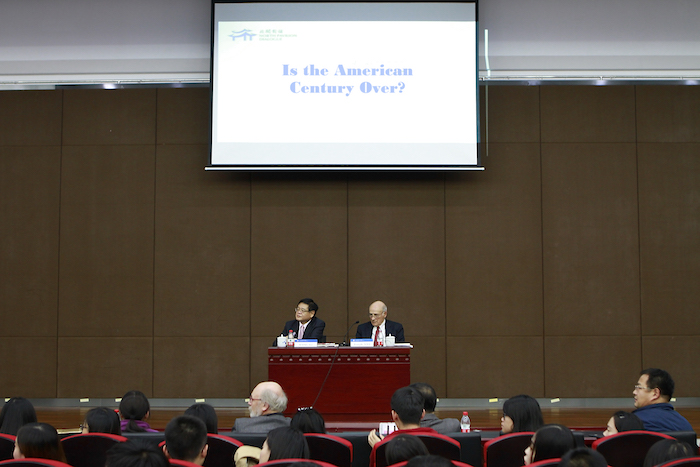In his speech given on October 21, 2016, at the Peking University School of International Studies, Joseph Nye argued that the American Century is not over. Putting the often used narrative of American decline into perspective, he provided reasons for his conclusion and called for American cooperation with China.

Professor Nye traced the origin of the term “American Century” back to an article by Henry Luce in 1941, urging the US to enter World War II after it had been on a rather isolationist path in the previous decades. Pointing to the differences between absolute and relative decline, he concluded that the US is not experiencing the former thanks to its leading position in technological innovation and the higher education system underpinning it. The observable relative decline in economic strength, he argued, is due to a return to the long term normal from a high share in global output when all major economies except the United States’ were destroyed after World War II. While agreeing that China is the most likely country to overtake the US in economic terms, he raised some doubt as to the predictions when this will happen, referring to a likely slowdown in economic growth in China.

After having analyzed the economic power, Nye went on to take a closer look at soft power. He attributed China’s soft power mainly to its achievements in economic development, the lifting of millions out of poverty as well as the attractiveness of Chinese traditional culture. However, China is not able to use this soft power in the same effective way as the US can, partly due to tighter government control and more nationalistic tendencies, according to Nye.

He concluded that the American Century is not over, if one understands the term as another country taking the lead. Nevertheless, the US cannot unilaterally dictate its conditions and has to work together with other powers. In this regard he called for cooperation in areas like combating climate change and pandemics.
During the ensuing Q&A session, Nye further elaborated on some points of his theory and provided some examples. On the question of economic interdependence, he pointed out that a symmetric relationship resulted in little mutual power, which could partly be seen in China-US economic relations. Concerning the mentioned cooperation, he acknowledged that this might not be completely possible in all areas, one example being cyberspace. Nye answered the final question on what Chinese policy makers could do to make take away by praising China for setting up the Asian Infrastructure Investment Bank, its engagement in peacekeeping missions, and the collaboration between the US and China on reaching a common ground for the Paris Agreement. In this spirit, according to Nye, the future will increasingly see cooperation between the two powers.
Written by: Christian Steidl
Edited by: Xu Zheqi



